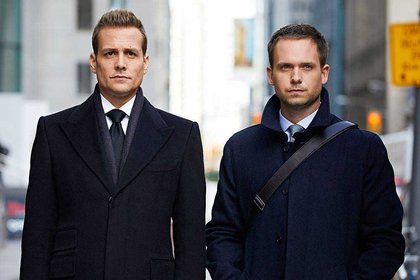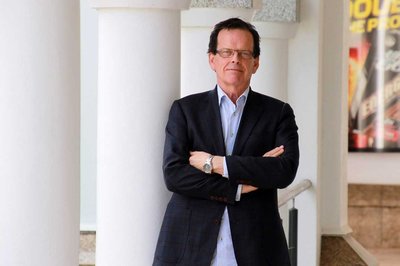
Suits characters Harvey Specter and Mike Ross represent two very different approaches to leading, but the combination works.
This is the second in a series of five articles on co-leadership by Dr Ralph Bathurst, who is the academic coordinator for Massey’s Master of Advanced Leadership programme. Each week he will explore aspects of co-leadership using popular tv series Suits and its main characters, Harvey Specter and Mike Ross, as exemplars.
Read Article 1: What Suits teaches us about better leadership models
Over the past few years I have been trying to figure out how the leadership field might move beyond the single leader at the top of an enterprise. I have come to see that the hierarchy is a dysfunctional form and that the further up the promotional ladder people rise, the more they become disconnected from the actual work of the organisation.
It is often in this state of detachment that leaders confront issues with staff and other stakeholders and, in the process, tend to become defensive and withholding. The leader then becomes embattled and withdraws from immediate contact with staff, only to soon move on to another organisation, repeating the cycle every two to five years yet without resolving the initial difficulties.
One way of working around the problem is to adopt a co-leadership model. Although this is rare in business and politics, it is the norm in the creative sector. Think of Lennon and McCartney of the Beatles, or Gilbert and Sullivan of the late 19th century comic operetta tradition; or Elton John and Bernie Taupin in their nearly 50-year creative partnership. In each case their ability to co-create made them enduring legends.

Dr Ralph Bathurst.
Harvey versus Mike
Suits presents a similar business solution to the problem of a single controlling leader. From the firm’s perspective Harvey Specter and Mike Ross are not equals. However, in terms of their daily practice, they come at problems as equals and solve them through a combination of their talents and motivations. Each uses the energy and insights of the other to progress their cases.
Harvey is a driven man who solves problems by taking advantage of a competitor’s weaknesses. For him, the ends justify the means so long as the ends are within the broadest constraints of the law. He doesn’t take soundings about what might be the most popular action to take, and it doesn’t matter to him whether he is admired or despised. Just so long as he wins. Therefore, for Harvey it is better not to become emotionally involved in cases because a sense of attachment and service will only weaken his hand.
Harvey is an archetypical leader ruled by his head. His intelligence and problem-solving skills see him succeed continually. Yet as viewers, along with the senior partners of the law firm, we become concerned that his supreme confidence (hubris, as the ancient Greeks called it) will eventually land him in deep trouble.
Mike Ross lost his parents at a young age and this tragedy defines his adult life and work. Mike feels deeply about the injustices his clients face and becomes emotionally connected to them. He cares and will go to extraordinary lengths to bring resolution to the most intractable problems. He is focused on the mental and social wellbeing of his clients as well as the legal case confronting them.
What does this tell us about leadership?
It’s very difficult for a single leader to embody both aggressive determination and compassion. Furthermore, some leaders worry that showing care and concern for staff is a sign of weakness, and that staff will take advantage of their goodwill. Co-leading can attend to the head and heart, and where two leaders of equal status operate in partnership, both the firm’s strategic direction and care for the staff employed to carry out the company’s purpose can be accomplished without one compromising the other.
It is vitally important that leaders care, especially when a staff member is going through tough times. Even though leaders are schooled to behave ethically and perhaps attend to the needs of staff, this education focuses primarily on the financials. However, this narrow perspective hides deeper ethical values that underpin our culture.
This narrow focus on the balance sheet to assess how a company has performed, and the assumption that financial measurement can determine whether a company has acted ethically or unethically, goes back to Descartes. He’s the philosopher who famously announced “cogito ergo sum” to solve his own problem of existence. To be able to think about existing proves that we exist, but this so-called Cartesian split has left us with a legacy of distrust for our feelings. We prefer thinking over feeling: thoughts can be verified through logic and inquiry; feelings are too subjective to be relied on as evidence for anything.
Harvey and Mike’s partnership brings together thinking and feeling; righteous acts and compassionate involvement; justice and mercy. This connecting relationship between thinking and feeling are the underpinnings of Western ethical systems, yet with one precondition. Within the Judeo-Christian values that background our culture, justice and mercy are both necessary elements, but they are not equal. When placed in a position of choosing one or the other, mercy is of a higher value than justice. This means that being compassionate will necessarily play a more important role in our ethical practices than doing what is right.
Harvey and Mike struggle with these two values and struggle they must, for it is in their arguing and debating that they find appropriate ways of settling troubling cases. There is no easy solution to difficult problems, but co-leading with the head and heart will help firms chart a pathway towards more humane and human workplaces.